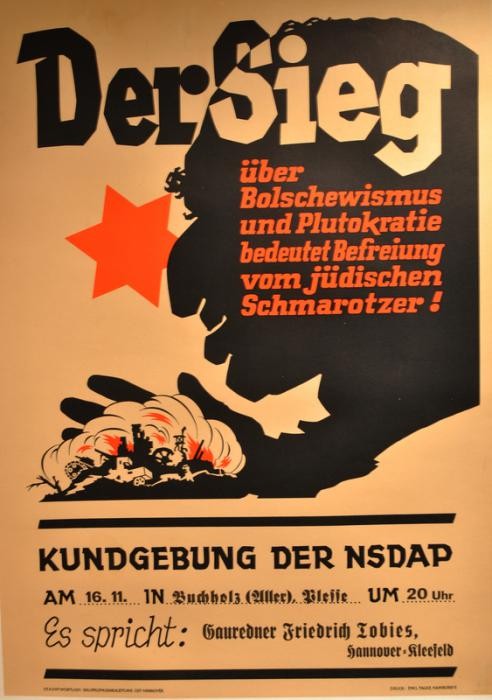
Antisemitism in History: Nazi Antisemitism
In the context of the economic depression of the 1930s, the Nazi Party gained popularity in part by presenting "Jews" as the source for a variety of political, social, economic, and ethical problems facing the German people. The Nazis used racist and also older social, economic, and religious imagery to this end. After seizing power, they continued to used the same means to gain legitimacy.
Inspired by Adolf Hitler's theories of racial struggle and the "intent" of the Jews to survive and expand at the expense of Germans, the Nazis, as a governing party from 1933-1938, ordered anti-Jewish boycotts, staged book burnings, and enacted anti-Jewish legislation. In 1935, the Nuremberg Laws defined Jews by race and mandated the total separation of "Aryans" and "non-Aryans." On November 9, 1938, the Nazis destroyed synagogues and the shop windows of Jewish-owned stores throughout Germany and Austria (Kristallnacht). These measures aimed at both legal and social segregation of Jews from Germans and Austrians.
Kristallnacht, the initiation of World War II in 1939, and the invasion of the Soviet Union in 1941 marked the transition to the era of destruction, in which genocide would become the key focus of Nazi antisemitism. To justify the murder of the Jews both to the perpetrators and to bystanders in Germany and Europe, the Nazis used not only racist arguments but also arguments derived from older negative stereotypes, including Jews as communist subversives, as war profiteers and hoarders, and as a danger to internal security because of their inherent disloyalty and opposition to Germany.
Critical Thinking Questions
- How did Nazi antisemitism build on previous beliefs and attitudes?
- How was Nazi antisemitism different than previous hatreds of Jews?
- Why do people generalize characteristics for an entire group? How can this be dangerous?
- How can deep-seated hatreds be countered?
- How can knowledge of the events in Germany and Europe before the Nazis came to power help citizens today respond to threats of genocide and mass atrocity in the world?

